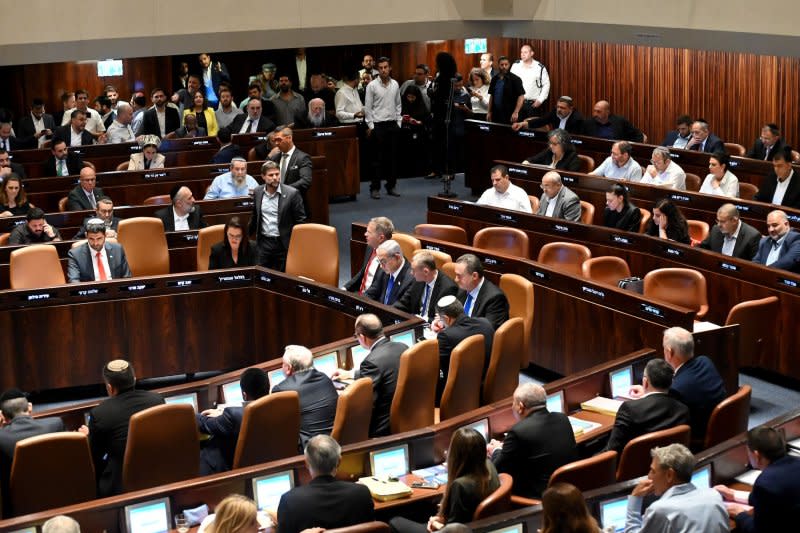Tens of thousands protest in Israel after passage of controversial judicial reforms

July 24 (UPI) -- Israel on Monday passed its so-called "reasonableness" law, reforming the nation's judiciary system, drawing celebrations from supporters and igniting massive protests from opponents.
The new law prevents Israeli courts from weighing in on the reasonableness of government and ministerial decisions. The vote ended hours of debate that started Sunday with intense protests outside the Knesset building, where demonstrators blocked roads and attempted to bar the entrance of the Legislature.
"We have taken the first step in a historic process to correct the judicial system," Israeli Justice Minister Yariv Levin said in celebrating the passage of the law.
On Monday, though, the White House lamented the the new law, saying it was "unfortunate."
Police in Jerusalem used water cannons to break up protesters who were marching along Begin Road and blocked traffic. Some demonstrators called for a rally outside the Knesset for Monday evening, while denunciations came from former security chiefs, former top jurists and politicians.

Israeli police reported 34 arrests by late Monday as tens of thousands of protesters decrying what they called a blow to Israel's democracy took to the streets across the country.
In one incident. police said three protesters marching on a highway in central Israel were slightly injured when a car purposely drove into them. The owner of the vehicle, described as a man in his 20s, was arrested, they added.

Prime Minister Benjamin Netanyahu, whose right-wing governing coalition pushed through the first of a series of planned measures amid a boycott by opposition lawmakers, said in his first comments following the vote the reasonableness law is necessary "to ensure that the elected government can implement policies in accordance with the majority of citizens' decisions.
"The realization of the voters' will is not the end of democracy; it is the essence of democracy," he declared.

U.S. President Joe Biden, who has previously voiced his disapproval of Netanyahu's push to ram through the judicial overhaul, sees the Knesset vote as "unfortunate," White House press secretary Karine Jean-Pierre said in a statement.
Noting the measure passed "with the slimmest possible majority," she reiterated the president's view that for "major changes in a democracy to be enduring [they] must have as broad a consensus as possible."

Jean-Pierre said Biden continues to support the efforts of Israeli President Isaac Herzog and other leaders "as they seek to build a broader consensus through political dialogue" on the remaining measures of the judicial overhaul, which set to be debated throughout the Knesset's summer recess and as perhaps as long as November.
An organization called the Movement for Quality Government said it filed a petition with the Israeli High Court over the new law.

"The government of destruction has raised its malicious hand against the state of Israel; now it's the Supreme Court's turn to step up and prevent this legislation," organization head Eliad Shraga said.
"It fundamentally changes the basic structure of Israeli parliamentary democracy and the nature of the regime, while de facto abolishing the judiciary and seriously damaging the delicate fabric of the separation of powers and the system of checks and balances in the state of Israel."
A coalition of 150 significant businesses refused to open to show their displeasure over the bill.
Israel's largest labor union, the Histadrut, has threatened to strike in hopes to duplicate a walkout in March that shuttered the country's economy and forced a delay in the judicial bill's process.
Military reservists also announced last week that they would stop serving if the measure is implemented.
Netanyahu's Finance Minister Bezalel Smotrich reportedly tried to arrange a last-minute compromise, offering to delay the law for six months, but it was immediately shot down by Levin and another Netanyahu hardliner, National Security Minister Itamar Ben-Gvir.
The 56 opposition members of the Knesset boycotted the bill's final vote, leaving it to pass 64-0.
The process started Monday as the Knesset weighed some 140 amendments to the law.
The vote came as Netanyahu, who has stood by the reforms despite fierce opposition, was released from the hospital after a more than day-long stay over the weekend to be fitted with a pacemaker.
Ahead of the vote, Levin told the Knesset that "reasonableness" was a subjective legal concept, stating that the high court was not justified in overruling elected officials based on the principle.
"You want to decide what's reasonable and what's not, instead of the people chosen by the nation?" Lenin said, referring to the high court judges. "That's reasonable?"
Opponents argued that the law would give the government unchecked and unchallenged power, threatening Israel's democracy.
Opposition leader Yair Lapid blasted the ruling coalition for failing to agree on a compromise.
"They want to tear apart the state, tear apart democracy, tear apart the security of Israel, the unity of the people of Israel, and our international relations," he said.

 Yahoo Autos
Yahoo Autos 